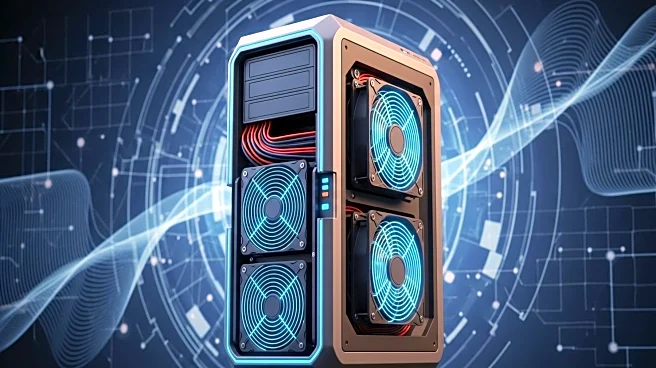What's Happening?
NVIDIA has introduced the DGX Spark, a compact desktop AI supercomputer, which has been named TIME's Best Invention of 2025. The DGX Spark is designed to lower the barrier to entry for high-performance AI computing, offering 1 petaFLOP of performance with the GB10 Grace Blackwell Superchip. This mini supercomputer is tailored for AI development, fine-tuning, and inference training, featuring a unified CPU and GPU setup, 128 GB of unified memory, and advanced connectivity options. Priced at $3,999, the DGX Spark aims to democratize access to AI technology, making it accessible to engineers, researchers, and data scientists.
Why It's Important?
The introduction of the DGX Spark represents a significant shift in the accessibility of AI technology. By offering high-performance computing at a relatively affordable price, NVIDIA is enabling a broader range of users to engage in AI development and research. This democratization of AI access could accelerate innovation across various sectors, including technology, healthcare, and finance, as more individuals and smaller teams can leverage powerful AI tools. The recognition by TIME underscores the potential impact of the DGX Spark in transforming how AI is developed and applied in real-world scenarios.
What's Next?
As the DGX Spark becomes available, it is expected to attract interest from a wide array of stakeholders, including academic institutions, startups, and established tech companies looking to enhance their AI capabilities. NVIDIA's focus on connectivity and clustering options suggests potential for expanded use in collaborative environments and larger-scale AI projects. The broader adoption of such technology could lead to increased competition in the AI hardware market, prompting other companies to innovate and offer similar solutions.
Beyond the Headlines
The DGX Spark's compact design and affordability may also influence ethical considerations in AI development. By making powerful AI tools more accessible, there is potential for increased scrutiny on how these technologies are used, particularly in terms of privacy, data security, and the ethical implications of AI-driven decisions. As AI becomes more integrated into everyday applications, discussions around responsible AI use and regulation are likely to intensify.









